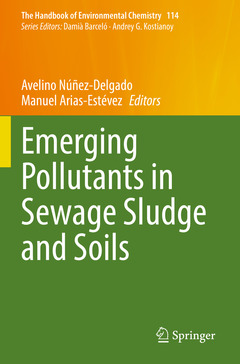Emerging Pollutants in Sewage Sludge and Soils, 1st ed. 2023 The Handbook of Environmental Chemistry Series, Vol. 114
Coordonnateurs : Núñez-Delgado Avelino, Arias-Estévez Manuel

This book provides an authoritative overview of emerging pollutants in sewage sludge and soils. It traces the latest research and new trends on the characterization, removal and treatment of such pollutants in urban and industrial sewage sludge and soils. The book covers topics such as antibiotic resistance, fate and environmental impact of contaminants of emerging concern, environmental transmission of human pathogenic viruses and their effect on soil, and the repercussion of various emerging pollutants on biodiversity. It also offers a case study of the epidemiology-based surveillance of SARS-CoV-2 in wastewater and sludge.
The book appeals not only to researchers and professionals working with emerging contaminants, but also to policy makers and a broader audience interested in learning more about the effects of these contaminants in human and environmental health.
Biotic and abiotic contamination due to emerging pollutants in sewage sludge and soils: a country-based perspective.- Pharmaceuticals and their metabolites in sewage sludge and soils: distribution and environmental risk assessment.- Microplastics in soils as a source of pollution and environmental risk.- Environmental transmission of human pathogens associated with SARS-CoV-2 and the effect on Soil and Aquatic Ecosystem – A biological way of management.- Innovative treatment processes for emerging contaminants removal from sewage sludge.- Emerging pollutants that can be transformed into PCDD/Fs.- An innovative technology to minimize biological sludge production and improve its quality in a circular economy perspective.- Fate of neonicotinoids in the environment- why bees are threatened.- Current progress of microplastics in sewage sludge.- Revision of the most harmful organic compounds present in sewage and sludge.- Identifying emerging pollutants using non-target or wide-screeningliquid chromatography-mass spectrometry.- Fate of emerging pollutants during anaerobic digestion of sewage sludge.- Pharmaceuticals and Personal Care Products as Contaminants of Emerging Concern in Sewage Sludge and Soils and the Role of Transformation Products in their Fate and Environmental Impact.- Current methodology for extraction, separation, identification and quantification of microplastics in terrestrial systems.- Emerging viruses in sewage sludge and soils.
Avelino Núñez-Delgado is a Professorat the Department of Soil Science and Agricultural Chemistry at the University of Santiago de Compostela. His main research interests include: recycling, studying red mud as a sorbent material, sewage sludge, wood ash, and other types of waste and by-products, as well as different mixtures, retention/inactivation of pathogens and chemical contaminants, and potential for agronomic recycling of various types of waste and by-products. Lately, his main research has been focused on the retention of pollutants, the use of by-products to reach this end, this facilitating recycling of these materials. He has published 100+ scientific articles, authored several book chapters and books and his research group has already registered 8 patents in these topics.
Manuel Arias-Estévez is a Professor-Researcher at the Department of Plant Biology and Soil Science, at the University of Vigo, Spain. His research focusses mainly on soil pollution characterization and treatment, as well as on agricultural chemistry. He has authored 200+ scientific articles, 6 book chapters/books, has given 150+ presentations at international congresses, and participated in more than 30 research projects. He is currently within the directive staff of “Sociedad Española de Ciencia del Suelo” (Spanish Soil Science Society) and is a member of the “International Union of Soil Science”.
Date de parution : 09-2023
Ouvrage de 305 p.
15.5x23.5 cm
Date de parution : 09-2022
Ouvrage de 305 p.
15.5x23.5 cm
Thèmes d’Emerging Pollutants in Sewage Sludge and Soils :
Mots-clés :
Contaminants of Emerging Concern; pathogens in sewage sludge; pollutants characterization; pollutants removal; Urban Sewage sludge; Industrial Sewage Sludge; Biosolids; Transformation products in soils; Abiotic Transformation; Biotic Transformation; Surveillance of SARS-CoV-2 in wastewater and sludge; Neonicotinoid contamination; Sewage-associated molecular marker genes; Fate of emerging pollutants; Biodegradation; soil pollution



